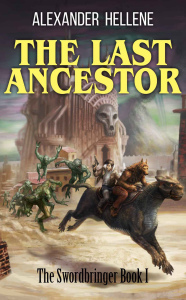Writing: You’re Not Doing It Wrong Despite What Internet Randos Might Say
[image error]
If writing hurts, you need to get a better typewriter.
No, no, that’s not it . . . let’s see . . .
If writing hurts, you should probably talk to your doctor about your arthritis . . .
Almost there . . . wait, I’ve got it:
If writing hurts, get that broken glass off of your keyboard, and buy a couple of Band-Aids to boot.
There. I’ve solved your problem.
What is this, exactly, a solution for? For a strange idea I was made aware of by my friend, the author Chris Lansdown, that writing should somehow hurt.
Chris shared this bit of Internet writing advice he came across:
Writing Tip: If “editing” your first draft consists of fixing a few typos and changing a word here and there, you’re not doing it right. A first draft should be ripped apart, refashioned, and sewn back together. Anything less is vanity.
“Anything less is vanity.” No, sorry. That’s not how it works.
As Chris notes, some writers can bang out very good first drafts. Others can’t. It’s not a question of “vanity” or “not doing it right.” It’s a question of skill and writing method. As with most things artistic, there is no right or wrong process, because process is not a one-size-fits-all thing. There are some universal tips and techniques that usually work for most people, but to say that usually first draft should be “ripped apart,” “refashioned,” and so on, or else you’re just ego tripping, is stupid.
I was going to say “preposterous,” but that’s too kind a word.
So where does this idea that “art is pain” come from? Do artists in other media think this way? Are painters like, “Listen bro: if you’re not painting over your entire painting 47 times, you’re doing it wrong!” Does a lack of ripping apart, refashioning, and sewing back together a first draft of a painting make, say, Bob Ross a bad painter?
NB: I will not tolerate Bob Ross slander on this blog. You have been warned.
Anyway, Chris gets to the root of where this idea comes from, and I agree with his assessment:
There is of course the explanation that such a writer just cannot see beyond their own limitations, but I can’t help but wonder if this attitude isn’t tied in to the idea of the tortured genius. It was an idea that, so far as I know, became popular somewhere in the 1800s, around the time of Byron and Shelley, who were tortured not so much be genius as by their inability to control their lust. Shelley, in particular, seems to have been afflicted in this way, and his vices seem to have been excused by himself and his wife and friends as, not weaknesses, but virtues. To try to say it was not bad for Percy Bysshe Shelly to cheat on his pregnant wife, they invented a new kind of morality where artists were excused from being halfway decent human beings because of the enormous value they gave to humanity. Their art, I mean.
I’m not sure why this idea was popular, but it does seem to have had some currency through at least the 1930s—at least if golden age detective stories are anything to go by. It also seems, curiously, to be more popular with women than with men; it seems to have been female writers who wrote about it approvingly, and within their fiction it was generally only the women (and occasionally a close male friend) who bought the nonsense. Why that is, I’m not sure. Perhaps it’s related to the “bad boy” phenomenon. And for that reason, the idea that one should tear a first draft up in a passion of anger at how far it falls short, and completely rework it, may be related.
As a related side-note, actual geniuses never seem to have been tortured, except occasionally by actual problems, like Beethoven being deaf. Shakespeare was, so far as we know, as reasonably happy as a recusant Catholic could have been in England in the late 1500s. Mozart seems to have no greater troubles than having a period when he didn’t make much money because a war made it hard for musicians; summary biographies don’t mention anything which would interest modern people by similarity, such as profound depression.
Shelly’s genius, to the degree that anyone still holds that he was a genius, seems very overrated. Ozymandias is a good poem, but certainly nothing worth excusing adultery for.
Casting the mind’s eye over other examples of tortured geniuses and actual geniuses, it seems like perhaps the thing that’s really attractive about the tortured genius is not the genius part, but the torture part. And I can’t help but think that this attitude that writing should be torture—what else can throwing away something one worked long and hard at be?—is an attempt to try to find some shreds of life in pain, by people who have no idea where to find life in this world.
Ah, the “tortured genius” trope. The artist featuring their hurt and inflicting their neuroses on US as they work them out via their art. You see this in the old Boomer mentality that “drugs totally made all of those bands good, maaaaan.”
It’s a joke to think that artists have to be tortured. It’s just silly. For every tortured genius, there are dozens of normal people who made fantastic art and weren’t miserable people and awful to others.
There’s another idea at play here, one we see with “aspiring writers” and other internet folks who look to other internet folks for validation that they’re doing this writing thing the right way: the idea of discipline.
“How do you handle writer’s block? What do you do if you don’t feel like writing?”
Just write, dammit. If you write or produce anything based upon the mercurial whims of your personal feelings, you’ll get nothing done. Hunker down and do it. You don’t perform your best at your day job based upon your feelings. At least, I sincerely hope you don’t; if you do, then God help your clients or anybody else who’s relying on you. Why would you rely on your feelings when it comes to doing something you ostensibly love to do, and would do for free?
I don’t understand it.
Finding the energy to do stuff will be the focus of another post, but it’s still an important issue to talk about now. I understand full well that the original poster didn’t say anything about a lack of motivation, and in fact the idea that a first draft should basically be destroyed and rewritten or else you’re doing it wrong might speak to the writer in question having a lot of discipline. It’s just that it’s dumb.
Also, what’s the point of writing Moby Dick just to tear it up and write Don Quixote instead. Where do you stop? When you tear up Don Quixote and write Harry Potter instead?
I’m being ridiculous to prove a point here. Everybody has their own writing process–outlining versus winging it is but one obvious example–and they’re all equally valid as long as they work for you. If your process allows you to produce good writing, then that process is successful. How that process looks doesn’t matter. Maybe it matters to Mr. or Mrs. “Anything less is vanity,” but it sure doesn’t matter to me. And it shouldn’t matter to you either.
You’re not doing it wrong, and you shouldn’t listen to random internet people who tell you that you are (but totally feel free to listen to random internet people who tell you that you’re not).
“This story is fantastic. Great setting, interesting worldbuilding, and solid characters. I loved it!”




